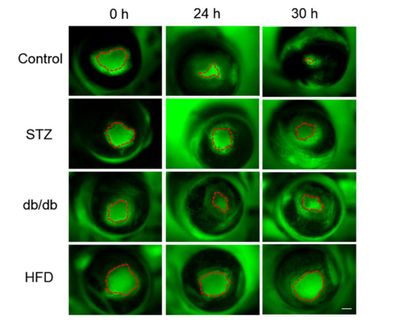Novartis gains positive CHMP opinion for Lucentis (ranibizumab) to treat vision loss due to macular edema secondary to RVO
Advertisement
Novartis has received a positive opinion from the Committee for Medicinal Products for Human Use (CHMP) for Lucentis® (ranibizumab) to treat patients with visual impairment due to macular edema secondary to retinal vein occlusion (RVO). Lucentis has been shown to improve vision and vision related quality of life for patients with visual impairment due to macular edema secondary to both branch-RVO (BRVO) and central-RVO (CRVO).
The recommendation to approve Lucentis was based on data from two Phase III studies in patients with BRVO (BRAVO) and CRVO (CRUISE). These studies showed that approximately 60% of BRVO and 48% of CRVO patients treated with monthly Lucentis gained at least 15 letters of visual acuity at six months, compared with 29% and 17% of those treated according to current standard practice, respectively. Patients maintained their visual acuity gains through to 12 months with as-needed dosing of Lucentis.
The pivotal data also showed that patients with BRVO experienced a mean gain from baseline of 18.3 letters in visual acuity at month six with monthly Lucentis injections, compared with a gain of 7.3 letters with current standard practice. Patients with CRVO experienced a mean gain from baseline of 14.9 letters at month six with monthly Lucentis injections, compared with a gain of 0.8 letters with current standard practice.
The safety data from the BRAVO and CRUISE trials were similar to previous studies examining Lucentis, with no new adverse events reported. At six months the most common ocular adverse events that occurred in the Lucentis-treated patients included conjunctival hemorrhage (48%) and eye pain (17%). In the BRAVO trial, there was one case of endophthalmitis, two arterial thrombo-embolic events, fatal hemorrhagic stroke and non-fatal myocardial infarction. One case of non-fatal myocardial infarction was reported in the sham group. In the CRUISE trial, systemic safety events included one case of either myocardial infarction or acute coronary syndrome in each of the three groups. There were no cerebrovascular accidents or deaths.
RVO is usually the result of a blockage forming in a blood vessel in the retina, which is the light-sensitive layer at the back of the eye. In CRVO, the blockage occurs in the main retinal vein at the optic nerve. In BRVO, the blockage occurs in one of the four branches of the main retinal vein. Both CRVO and BRVO can lead to swelling of the macula, which is the central portion of the retina. This swelling of the macula, or macular edema, is the most common cause of visual impairment in patients with RVO. RVO often leads to increased production of vascular endothelial growth factor (VEGF), which can exacerbate the RVO complications.
Laser treatment, the current standard of care for patients with macular edema in BRVO, may provide gradual and partial improvements in visual acuity, though many patients fail to regain vision despite treatment. Laser therapy is not indicated for patients with macular edema in CRVO. Currently, observation is the usual course of action available to these patients.
Lucentis is an antibody fragment that is injected into the eye and acts by neutralizing VEGF. Lucentis is currently licensed in more than 85 countries for the treatment of wet age-related macular degeneration (AMD) and in the European Union for visual impairment due to diabetic macular edema.
Lucentis was developed by Genentech and Novartis. Genentech has the commercial rights to Lucentis in the United States, where Lucentis is also approved for the treatment of macular edema following RVO. Novartis has exclusive rights in the rest of the world.























































